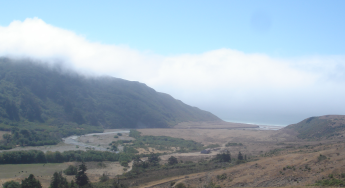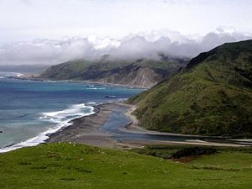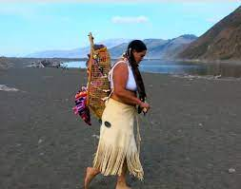Bear River Applied Anthropology Field School



The Tribal community established a relationship with the Wildlands Conservancy through Bear River Band of Rohnerville Rancheria to implement projects that will re-establish culturally vital landscapes and programs. These projects will benefit indigenous communities, particularly youth, through implementation of Traditional Ecological Knowledge (TEK). Cal Poly Humboldt supports these efforts with the Bear River Applied Anthropology Field School program. This field school program has two major interrelated themes:
-
An anthropological examination of cultural and linguistic practices and materials. Students will study modern California life ways, the sociocultural history of northern California, language systems and verbal traditions, and the impact of colonization and development, among other topics.
-
Archaeology, includes practical training in field techniques and classes relating to California cultures and settlement studies. Students will make observations of archaeological finds and learn associated field techniques.
Field School Dates for Upcoming Programs: TBA (no program summer 2024)
- The program typically runs from mid-July to early August. It begins with online preparation work, following by hands-on activities at Cal Poly Humboldt campus and then in the field at the Bear River Band Mattole Property.
Course Credit:
The program typically consists of the following courses two courses, totalling 6 units:
- ANTH 329 Bear River Culture & Socioecological Change: This course provides students with training in applied anthropological methods and theories to address socioecological issues involving Indigenous nations in Northern California with a focus on the Bear River Band of the Rohnerville Rancheria. Students will learn from tribal elders and other members, community partners, and other guest speakers on themes related to traditional ecological knowledge, language and cultural revitalization efforts, foodways, the history of settler colonialism in the North Coast, and the social impacts of environmental change.
- ANTH 359 California Archaeology: Interpreting the Past: This course is a program in the methods and techniques of archaeological excavation and interpretation, aimed at developing skills. Training and seminars led by specialists engage students with the methods of excavation and interpretation, of artifact and environmental studies, and of archaeological research methods.
The following short course is for participants attending only for the cultural monitoring component.
- ANTH 359 Monitoring Training at the Bear River Field School (2 units): The students will learn the basic necessities of monitoring archaeological and construction projects with an emphasis on both artifacts and culturally important items or areas of interest to provide a holistic perspective to both archaeological and Native American monitors.
Application Process:
- The initial deadline to apply is TBA
- Late applications will be accepted on a rolling basis until until the program is full.
- Applications will be reviewed and participants selected and notified of their status.
- All Cal Poly Humboldt student applicants should meet with their Academic Advisor prior to applying, to see how the program courses may count for their major, minor and/or degree.
- Please understand that space is limited and those not initially selected will be placed on a waiting list. Although the program is open to students from any university and community members, initial preference for acceptance will be given to members of the Bear River Band of the Rohnerville Rancheria and to Cal Poly Humboldt students.
Fees & Materials:
- Program fee: TBD
- Plus tuition: TBD
- Fees cover the following: The program fee includes transportation from Cal Poly Humboldt to the field site and back to Cal Poly Humboldt after, camping fees and meals while in the field, and course instructional and equipment fees.
- In addition, students will need to cover the cost of the following, not covered by program fees: Cost of travel to and from Cal Poly Humboldt for the on-campus activities and before and after the field component, and personal costs (meals, lodging, etc...) during the on-campus portion of the program. Students are responsible for arranging their own housing for the two on-campus days - dorm rooms may be available (with a fee).
- Students will need to provide their own basic camping gear (tent, sleeping pad, and sleeping bag); but Instructors can help students find items to purchase/rent if you don't have them.
Contact Information:
Email: anth@humboldt.edu
